- Home
- Virginia Woolf
Woolf Short Stories Page 15
Woolf Short Stories Read online
Page 15
He took up another volume and opened it at random. "What a coward I am! I let the chance slip again. But it seemed selfish to bother him with my own affairs, when he has so much to think about. And we so seldom have an evening alone." What was the meaning of that? Oh, here was the explanation-it referred to her work in the East End. "I plucked up courage and talked to Gilbert at last. He was so kind, so good. He made no objection." He remembered that conversation. She had told him that she felt so idle, so useless. She wished to have some work of her own. She wanted to do something-she had blushed so prettily, he remembered, as she said it, sitting in that very chair-to help others. He had bantered her a little. Hadn't she enough to do looking after him, after her home? Still, if it amused her, of course he had no objection. What was it? Some district? Some committee? Only she must promise not to make herself ill. So it seemed that every Wednesday she went to Whitechapel. He remembered how he hated the clothes she wore on those occasions. But she had taken it very seriously, it seemed. The diary was full of references like this: "Saw Mrs. Jones. . . She has ten children. . . . Husband lost his arm in an accident. . . . Did my best to find a job for Lily." He skipped on. His own name occurred less frequently. His interest slackened. Some of the entries conveyed nothing to him. For example: "Had a heated argument about socialism with B. M." Who was B. M.? He could not fill in the initials; some woman, he supposed, that she had met on one of her committees. "B. M. made a violent attack upon the upper classes. . . . I walked back after the meeting with B. M. and tried to convince him. But he is so narrow-minded." So B. M. was a man-no doubt one of those "intellectuals," as they call themselves, who are so violent, as Angela said, and so narrow-minded. She had invited him to come and see her apparently. "B. M. came to dinner. He shook hands with Minnie!" That note of exclamation gave another twist to his mental picture. B. M., it seemed, wasn't used to parlour-maids; he had shaken hands with Minnie. Presumably he was one of those tame working men who air their views in ladies' drawing-rooms. Gilbert knew the type, and had no liking for this particular specimen, whoever B. M. might be. Here he was again. "Went with B. M. to the Tower of London. . . . He said revolution is bound to come . . . He said we live in a Fool's Paradise." That was just the kind of thing B. M. would say-Gilbert could hear him. He could also see him quite distinctly-a stubby little man, with a rough beard, red tie, dressed as they always did in tweeds, who had never done an honest day's work in his life. Surely Angela had the sense to see through him? He read on. "B. M. said some very disagreeable things about-" The name was carefully scratched out. "I told him I would not listen to any more abuse of-" Again the name was obliterated. Could it have been his own name? Was that why Angela covered the page so quickly when he came in? The thought added to his growing dislike of B.M. He had had the impertinence to discuss him in this very room. Why had Angela never told him? It was very unlike her to conceal anything; she had been the soul of candour. He turned the pages, picking out every reference to B. M. "B. M. told me the story of his childhood. His mother went out charring . . . When I think of it, I can hardly bear to go on living in such luxury. . . . Three guineas for one hat!" If only she had discussed the matter with him, instead of puzzling her poor little head about questions that were much too difficult for her to understand! He had lent her books. KARL MARX, THE COMING REVOLUTION. The initials B.M., B. M., B. M., recurred repeatedly. But why never the full name? There was an informality, an intimacy in the use of initials that was very unlike Angela. Had she called him B. M. to his face? He read on. "B. M. came unexpectedly after dinner. Luckily, I was alone." That was only a year ago. "Luckily"-why luckily?-"I was alone." Where had he been that night? He checked the date in his engagement book. It had been the night of the Mansion House dinner. And B. M. and Angela had spent the evening alone! He tried to recall that evening. Was she waiting up for him when he came back? Had the room looked just as usual? Were there glasses on the table? Were the chairs drawn close together? He could remember nothing-nothing whatever, nothing except his own speech at the Mansion House dinner. It became more and more inexplicable to him-the whole situation; his wife receiving an unknown man alone. Perhaps the next volume would explain. Hastily he reached for the last of the diaries-the one she had left unfinished when she died. There, on the very first page, was that cursed fellow again. "Dined alone with B.M. . . . He became very agitated. He said it was time we understood each other. . . . I tried to make him listen. But he would not. He threatened that if I did not . . ." the rest of the page was scored over. She had written "Egypt. Egypt. Egypt," over the whole page. He could not make out a single word; but there could be only one interpretation: the scoundrel had asked her to become his mistress. Alone in his room! The blood rushed to Gilbert Clandon's face. He turned the pages rapidly. What had been her answer? Initials had ceased. It was simply "he" now. "He came again. I told him I could not come to any decision. . . . I implored him to leave me." He had forced himself upon her in this very house. But why hadn't she told him? How could she have hesitated for an instant? Then: "I wrote him a letter." Then pages were left blank. Then there was this: "No answer to my letter." Then more blank pages; and then this: "He has done what he threatened." After that-what came after that? He turned page after page. All were blank. But there, on the very day before her death, was this entry: "Have I the courage to do it too?" That was the end.
Gilbert Clandon let the book slide to the floor. He could see her in front of him. She was standing on the kerb in Piccadilly. Her eyes stared; her fists were clenched. Here came the car. . . .
He could not bear it. He must know the truth. He strode to the telephone.
"Miss Miller!" There was silence. Then he heard someone moving in the room.
"Sissy Miller speaking"-her voice at last answered him.
"Who," he thundered, "is B. M.?"
He could hear the cheap clock ticking on her mantelpiece; then a long drawn sigh. Then at last she said:
"He was my brother."
He WAS her brother; her brother who had killed himself. "Is there," he heard Sissy Miller asking, "anything that I can explain?"
"Nothing!" he cried. "Nothing!"
He had received his legacy. She had told him the truth. She had stepped off the kerb to rejoin her lover. She had stepped off the kerb to escape from him.
1944
TOGETHER AND APART
Mrs. Dalloway introduced them, saying you will like him. The conversation began some minutes before anything was said, for both Mr. Serle and Miss Arming looked at the sky and in both of their minds the sky went on pouring its meaning though very differently, until the presence of Mr. Serle by her side became so distinct to Miss Anning that she could not see the sky, simply, itself, any more, but the sky shored up by the tall body, dark eyes, grey hair, clasped hands, the stern melancholy (but she had been told "falsely melancholy") face of Roderick Serle, and, knowing how foolish it was, she yet felt impelled to say:
"What a beautiful night!"
Foolish! Idiotically foolish! But if one mayn't be foolish at the age of forty in the presence of the sky, which makes the wisest imbecile-mere wisps of straw-she and Mr. Serle atoms, motes, standing there at Mrs. Dalloway's window, and their lives, seen by moonlight, as long as an insect's and no more important.
"Well!" said Miss Anning, patting the sofa cushion emphatically. And down he sat beside her. Was he "falsely melancholy," as they said? Prompted by the sky, which seemed to make it all a little futile-what they said, what they did-she said something perfectly commonplace again:
"There was a Miss Serle who lived at Canterbury when I was a girl there."
With the sky in his mind, all the tombs of his ancestors immediately appeared to Mr. Serle in a blue romantic light, and his eyes expanding and darkening, he said: "Yes.
"We are originally a Norman family, who came over with the Conqueror. That is a Richard Serle buried in the Cathedral. He was a knight of the garter."
Miss Arming felt that she had struck accidentally
the true man, upon whom the false man was built. Under the influence of the moon (the moon which symbolized man to her, she could see it through a chink of the curtain, and she took dips of the moon) she was capable of saying almost anything and she settled in to disinter the true man who was buried under the false, saying to herself: "On, Stanley, on"-which was a watchword of hers, a secret spur, or scourge such as middle-aged people often make to flagellate some inveterate vice, hers being a deplorable timidity, or rather indolence, for it was not so much that she lacked courage, but lacked energy, especially in talking to men, who frightened her rather, and so often her talks petered out into dull commonplaces, and she had very few men friends-very few intimate friends at all, she thought, but after all, did she want them? No. She had Sarah, Arthur, the cottage, the chow and, of course THAT, she thought, dipping herself, sousing herself, even as she sat on the sofa beside Mr. Serle, in THAT, in the sense she had coming home of something collected there, a cluster of miracles, which she could not believe other people had (since it was she only who had Arthur, Sarah, the cottage, and the chow), but she soused herself again in the deep satisfactory possession, feeling that what with this and the moon (music that was, the moon), she could afford to leave this man and that pride of his in the Serles buried. No! That was the danger-she must not sink into torpidity-not at her age. "On, Stanley, on," she said to herself, and asked him:
"Do you know Canterbury yourself?"
Did he know Canterbury! Mr. Serle smiled, thinking how absurd a question it was-how little she knew, this nice quiet woman who played some instrument and seemed intelligent and had good eyes, and was wearing a very nice old necklace-knew what it meant. To be asked if he knew Canterbury. When the best years of his life, all his memories, things he had never been able to tell anybody, but had tried to write-ah, had tried to write (and he sighed) all had centred in Canterbury; it made him laugh.
His sigh and then his laugh, his melancholy and his humour, made people like him, and he knew it, and yet being liked had not made up for the disappointment, and if he sponged on the liking people had for him (paying long calls on sympathetic ladies, long, long calls), it was half bitterly, for he had never done a tenth part of what he could have done, and had dreamed of doing, as a boy in Canterbury. With a stranger he felt a renewal of hope because they could not say that he had not done what he had promised, and yielding to his charm would give him a fresh start-at fifty! She had touched the spring. Fields and flowers and grey buildings dripped down into his mind, formed silver drops on the gaunt, dark walls of his mind and dripped down. With such an image his poems often began. He felt the desire to make images now, sitting by this quiet woman.
"Yes, I know Canterbury," he said reminiscently, sentimentally, inviting, Miss Anning felt, discreet questions, and that was what made him interesting to so many people, and it was this extraordinary facility and responsiveness to talk on his part that had been his undoing, so he thought often, taking his studs out and putting his keys and small change on the dressing-table after one of these parties (and he went out sometimes almost every night in the season), and, going down to breakfast, becoming quite different, grumpy, unpleasant at breakfast to his wife, who was an invalid, and never went out, but had old friends to see her sometimes, women friends for the most part, interested in Indian philosophy and different cures and different doctors, which Roderick Serle snubbed off by some caustic remark too clever for her to meet, except by gentle expostulations and a tear or two-he had failed, he often thought, because he could not cut himself off utterly from society and the company of women, which was so necessary to him, and write. He had involved himself too deep in life-and here he would cross his knees (all his movements were a little unconventional and distinguished) and not blame himself, but put the blame off upon the richness of his nature, which he compared favourably with Wordsworth's, for example, and, since he had given so much to people, he felt, resting his head on his hands, they in their turn should help him, and this was the prelude, tremulous, fascinating, exciting, to talk; and images bubbled up in his mind.
"She's like a fruit tree-like a flowering cherry tree," he said, looking at a youngish woman with fine white hair. It was a nice sort of image, Ruth Anning thought-rather nice, yet she did not feel sure that she liked this distinguished, melancholy man with his gestures; and it's odd, she thought, how one's feelings are influenced. She did not like HIM, though she rather liked that comparison of his of a woman to a cherry tree. Fibres of her were floated capriciously this way and that, like the tentacles of a sea anemone, now thrilled, now snubbed, and her brain, miles away, cool and distant, up in the air, received messages which it would sum up in time so that, when people talked about Roderick Serle (and he was a bit of a figure) she would say unhesitatingly: "I like him," or "I don't like him," and her opinion would be made up for ever. An odd thought; a solemn thought; throwing a green light on what human fellowship consisted of.
"It's odd that you should know Canterbury," said Mr. Serle. "It's always a shock," he went on (the white-haired lady having passed), "when one meets someone" (they had never met before), "by chance, as it were, who touches the fringe of what has meant a great deal to oneself, touches accidentally, for I suppose Canterbury was nothing but a nice old town to you. So you stayed there one summer with an aunt?" (That was all Ruth Anning was going to tell him about her visit to Canterbury.) "And you saw the sights and went away and never thought of it again."
Let him think so; not liking him, she wanted him to run away with an absurd idea of her. For really, her three months in Canterbury had been amazing. She remembered to the last detail, though it was merely a chance visit, going to see Miss Charlotte Serle, an acquaintance of her aunt's. Even now she could repeat Miss Serle's very words about the thunder. "Whenever I wake, or hear thunder in the night, I think 'Someone has been killed'." And she could see the hard, hairy, diamond-patterned carpet, and the twinkling, suffused, brown eyes of the elderly lady, holding the teacup out unfilled, while she said that about the thunder. And always she saw Canterbury, all thundercloud and livid apple blossom, and the long grey backs of the buildings.
The thunder roused her from her plethoric middle-aged swoon of indifference; "On, Stanley, on," she said to herself; that is, this man shall not glide away from me, like everybody else, on this false assumption; I will tell him the truth.
"I loved Canterbury," she said.
He kindled instantly. It was his gift, his fault, his destiny.
"Loved it," he repeated. "I can see that you did."
Her tentacles sent back the message that Roderick Serle was nice.
Their eyes met; collided rather, for each felt that behind the eyes the secluded being, who sits in darkness while his shallow agile companion does all the tumbling and beckoning, and keeps the show going, suddenly stood erect; flung off his cloak; confronted the other. It was alarming; it was terrific. They were elderly and burnished into a glowing smoothness, so that Roderick Serle would go, perhaps to a dozen parties in a season, and feel nothing out of the common, or only sentimental regrets, and the desire for pretty images-like this of the flowering cherry tree-and all the time there stagnated in him unstirred a sort of superiority to his company, a sense of untapped resources, which sent him back home dissatisfied with life, with himself, yawning, empty, capricious. But now, quite suddenly, like a white bolt in a mist (but this image forged itself with the inevitability of lightning and loomed up), there it had happened; the old ecstasy of life; its invincible assault; for it was unpleasant, at the same time that it rejoiced and rejuvenated and filled the veins and nerves with threads of ice and fire; it was terrifying. "Canterbury twenty years ago," said Miss Anning, as one lays a shade over an intense light, or covers some burning peach with a green leaf, for it is too strong, too ripe, too full.
Sometimes she wished she had married. Sometimes the cool peace of middle life, with its automatic devices for shielding mind and body from bruises, seemed to her, compared with the thunder and
the livid apple-blossom of Canterbury, base. She could imagine something different, more like lightning, more intense. She could imagine some physical sensation. She could imagine-
And, strangely enough, for she had never seen him before, her senses, those tentacles which were thrilled and snubbed, now sent no more messages, now lay quiescent, as if she and Mr. Serle knew each other so perfectly, were, in fact, so closely united that they had only to float side by side down this stream.

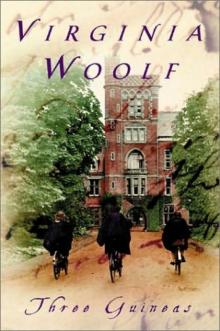 Three Guineas
Three Guineas Flush
Flush Mrs. Dalloway
Mrs. Dalloway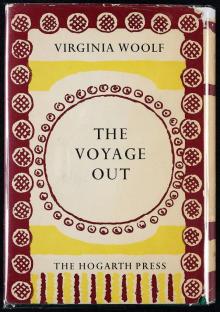 The Voyage Out
The Voyage Out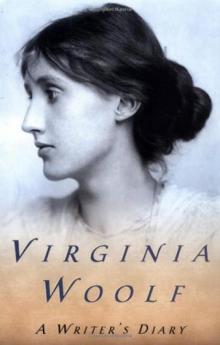 A Writer's Diary: Being Extracts From the Diary of Virginia Woolf
A Writer's Diary: Being Extracts From the Diary of Virginia Woolf To The Lighthouse
To The Lighthouse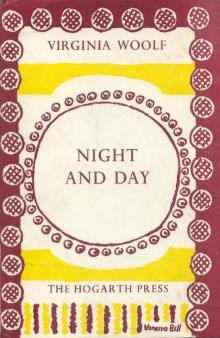 Night and Day
Night and Day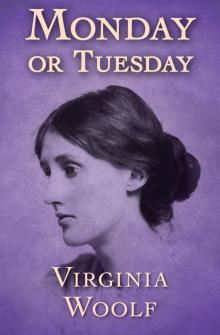 Monday or Tuesday
Monday or Tuesday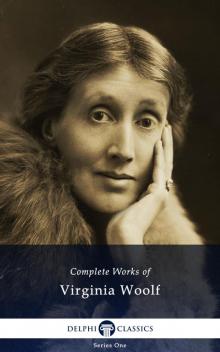 Complete Works of Virginia Woolf
Complete Works of Virginia Woolf Orlando
Orlando Genius and Ink
Genius and Ink Mrs. Dalloway (Annotated)
Mrs. Dalloway (Annotated) Jacob's Room
Jacob's Room THE RUSSIAN POINT OF VIEW
THE RUSSIAN POINT OF VIEW A Writer's Diary
A Writer's Diary Woolf Short Stories
Woolf Short Stories